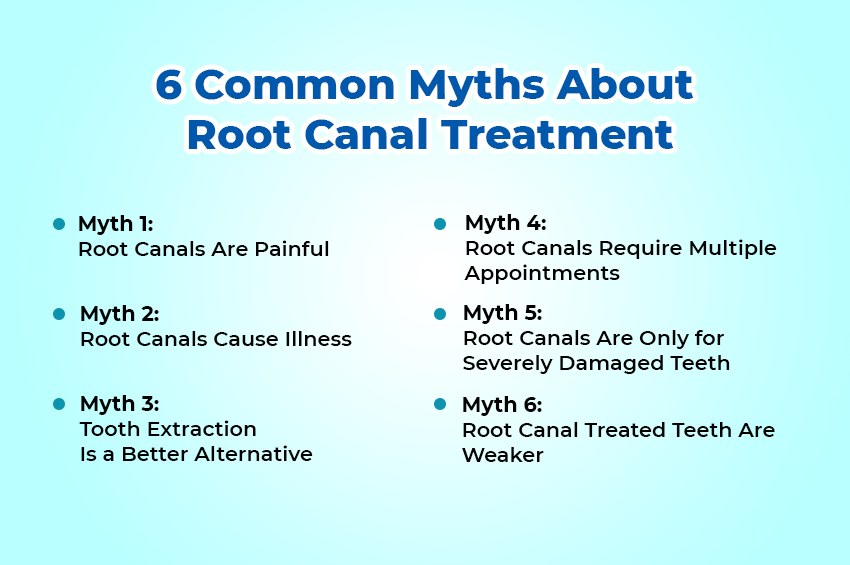Delhi Address:
36-A, Pocket 2, Sector 6, Behind Sector 6 Market, Dwarka, Delhi
Gurugram Address:
R2 136 M3M 65th Avenue Sector 65, Golf course extension road. Gurgaon Haryana 122101

Have you ever wondered why root canals have such a scary reputation? Are you curious about what's fact and what's fiction when it comes to saving damaged teeth? You arrived at the right place.
Root canal treatment is a dental procedure designed to save a damaged or infected tooth, but it often gets a bad rap due to misconceptions and myths. In this blog, we will debunk six common root canal treatment myths, shedding light on the truth behind this essential dental procedure.

One of the most prevalent root canal treatment myths is that they are excruciatingly painful. In reality, the process is not too painful, thanks to developments in anaesthesia and dental technology. Dentists numb the affected area with local anaesthesia to ensure that patients feel little to no discomfort during treatment. After the treatment, the majority of patients report feeling better at ease as the pain resulting from the infected tooth is reduced.
Another widespread misconception is that root canals can lead to systemic illnesses. This myth originated in the early 20th century and has been debunked by extensive scientific research. Without having any negative impacts on health, root canal therapy removes the infection from the tooth when done by qualified specialists. In reality, it promotes general health by preventing the spread of infection to other bodily parts.
Some people believe that extracting a damaged tooth is a better solution than undergoing a root canal. But keeping your natural teeth intact is essential to maintaining both good dental health and good looks. A tooth extraction may result in several problems, including trouble eating, adjacent teeth that are not appropriately aligned, and an increased risk of gum disease. By preserving your original tooth, root canal treatment helps avoid these issues and encourages better oral hygiene.
While some complex cases might require multiple appointments, many root canal procedures can be completed in a single visit to the dentist. Advances in dental techniques and equipment have significantly reduced the time needed for root canal treatments. Dentists for root canal treatment in Delhi can efficiently clean and seal the infected tooth, ensuring a swift and effective procedure. It's essential to consult your dentist, who can assess your specific situation and provide personalised guidance.
Root canal treatment is commonly associated with severe tooth damage. Still, it is also suitable for teeth with deep cavities or inflammation of the pulp (the innermost part of the tooth). Dentists recommend root canals when the tooth's pulp becomes infected or inflamed due to deep decay, repeated dental procedures, or trauma. Early intervention with a root canal can prevent the infection from worsening and preserve the tooth's structure and function.
Some people believe that teeth treated with root canals become weaker and more susceptible to fractures. In reality, a tooth that has undergone a root canal procedure can last a lifetime with proper care. After the root canal, the dentist usually places a crown on the treated tooth to strengthen and protect it from further damage. With good oral hygiene practices and regular dental check-ups, a tooth that has had a root canal can be just as strong and functional as any other tooth in your mouth.
Understanding the truth about root canal treatment myths is essential for making informed decisions about your dental health. Root canals are not painful, do not cause illnesses, and are often completed in a single visit. Preserving your natural teeth through root canal treatment is a better alternative to extraction, and it can prevent further oral health problems.
Remember, consulting your dentist is the best way to dispel any myths and ensure you receive accurate information tailored to your specific dental needs. Don't let misconceptions prevent you from seeking the dental care you need and deserve.
So, if you are looking for the best dental clinic in Dwarka, Vital Dental Care is here to help you. We are known for providing the best root canal treatment in Delhi to give you a perfect, radiant smile. Book an appointment now to learn more.
A: No, getting a root canal nowadays is almost painless. Dentists use local anaesthesia to ensure their patients are comfortable throughout the process. Once the root canal is completed, many patients experience a reduction in the pain brought on by the infected tooth.
Q2: Can a root canal cause health problems?A: No, root canals do not cause health problems. This is a common misconception. When professionally administered, root canal therapy eliminates tooth infections without hurting general health. In reality, they enhance health by stopping the spread of infection.
Q3: How long does a root canal procedure take?A: While complex cases might require multiple appointments, many root canal treatments can be completed in one visit. Advanced techniques and equipment have significantly reduced the time needed for this procedure, making it efficient and convenient.
Q4: Do root canal treated teeth become weaker?A: No, root canal treated teeth can last a lifetime with proper care. After the procedure, a dentist usually places a crown on the tooth, strengthening it and protecting it from further damage. With good oral hygiene and regular check-ups, a tooth treated with a root canal can be as strong as any other tooth.

